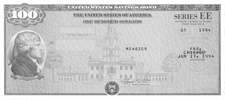
Know Thy Bonds

Know Thy Bonds
INFORMATION IS TO THE BEST RETURN ON YOUR INVESTMENT
by Daniel Pederson
It's time to take out those U.S. Savings Bonds, dust them off, and ask some important
questions? Are they still earning interest? How much are they worth? What interest rates
are they earning? Which rules apply to each? Knowing the answers can make a significant
difference in the return on your investment. Not knowing can mean forfeiting hundreds or,
in some cases, thousands of dollars.
![]() When you evaluate your bonds, you may be in for
a few surprises. A financial planner on the East Coast was meeting with a client when the
subject of savings bonds came up. In an off-hand manner, the client mentioned that he had
about $60,000 of U.S. Savings Bonds. The planner decided to get the bonds evaluated and
faxed a list of the bonds to The Savings Bond Informer. The ensuing report held some
unexpected surprises for both planner and the bond owner.
When you evaluate your bonds, you may be in for
a few surprises. A financial planner on the East Coast was meeting with a client when the
subject of savings bonds came up. In an off-hand manner, the client mentioned that he had
about $60,000 of U.S. Savings Bonds. The planner decided to get the bonds evaluated and
faxed a list of the bonds to The Savings Bond Informer. The ensuing report held some
unexpected surprises for both planner and the bond owner.
![]() Surprise #1: The face value of the bonds
was indeed $60,000. The actual redemption value, however, was over $240,000. This client
had almost a quarter of a million dollars in U.S. Savings Bonds.
Surprise #1: The face value of the bonds
was indeed $60,000. The actual redemption value, however, was over $240,000. This client
had almost a quarter of a million dollars in U.S. Savings Bonds.
![]() Surprise #2: Bonds totaling over $50,000
(of the $240,000) had stopped earning interest over five years ago. This money had been
sitting, as if buried in the backyard, without earning a dime of interest.
Surprise #2: Bonds totaling over $50,000
(of the $240,000) had stopped earning interest over five years ago. This money had been
sitting, as if buried in the backyard, without earning a dime of interest.
Are Your Bonds Still Earning Interest? Americans hold over $2.6 billion of U.S. Savings Bonds that have stopped earning interest. This is an interest-free loan to one of your distant relatives-your dear old Uncle Sam. Any Series E Bond over 40 years old has stopped earning interest. Series E Bonds issued December 1965 and after will stop earning interest 30 years from the date of purchase.
How Much are Your Bonds Worth? Savings Bonds could be worth as little as half the face value if recently purchased or as much as seven times their face value if they were purchased in the 1950s. If you think you have $10,000 of U.S. Savings Bonds, it means the value could be as low as $5,000 or as high as $70,000. Knowing your Bonds' exact value may help you decide where to spend that next vacation.
What Interest Rate is Each of Your Bonds Earning? Each Bond can have a unique interest rate, or rates, determined by the specific date of purchase. Suppose you are contemplating redeeming or exchanging some of your Bonds. If half your Bonds are earning 7.5% and the other half are earning 4%, it would make sense to keep the ones with higher rates.
Which Rules Apply to Your Bonds? On May 1, 1995, a new set of rules went into
effect for series EE Bonds purchased on or after that date. The guaranteed rate, a 50-year
tradition, has been eliminated. In place of the guaranteed rate, there is now a short-term
variable rate based on 85% of the average yield for six-month Treasury-bills, for Bonds
held five years or less, and a long-term variable rate for Bonds held more than five
years. The new rules do not apply to series E, H, HH, SN, or to EE Bonds purchased before
May 1, 1995. The old rules vary, depending on the specific issue dates of your Bonds.
![]() For a series EE Bond purchased today, you will
receive an interest rate of 4.36% for the first six months you hold the bond. Every six
months, your bond will receive a new interest rate determined by the market rate in effect
at that time.
For a series EE Bond purchased today, you will
receive an interest rate of 4.36% for the first six months you hold the bond. Every six
months, your bond will receive a new interest rate determined by the market rate in effect
at that time.
Tax Issues: Interest earned on U.S. Savings Bonds is subject to federal tax but exempt from state and local taxes. In some cases the interest may be exempt from federal taxes if the Bonds qualify for the tax-free educational feature. Several guidelines do apply in order to qualify for the educational feature.
![]() The days of tucking your Bonds in a drawer
and forgetting about them are over. Understanding and tracking your Savings Bond
investment are critical to your financial well-being.
The days of tucking your Bonds in a drawer
and forgetting about them are over. Understanding and tracking your Savings Bond
investment are critical to your financial well-being.
About the author: Daniel Pederson supervised the Savings Bond Division at the Federal Reserve Bank of Chicago-Detroit Branch for four years before founding The Savings Bond Informer, Inc. He is the author of U.S. Savings Bonds: A Comprehensive Guide for Bond Owners and Financial Professionals (TSBI Publishing, $24.95). For additional information, call, 800-927-1901 or click here.
![]()